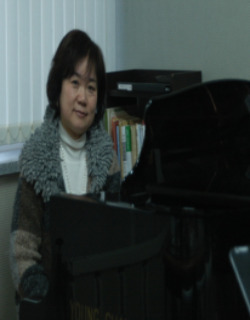
Many people want to learn a musical instrument. But some of them cannot learn how to play it because of their financial difficulty or physical handicap. For them, there is an agency to give messages of hope to those people, which is called the 'Music Harmony Youth Agency'. The agency is designed to educate financially underprivileged adolescents and physically and mentally disabled people in cultural arts through the mentor project. Through the project unemployed graduates majoring in music-related fields help individuals in underprivileged groups develop musical sensitivity and creativity of their own. The purpose of the agency is to improve participants' cultural awareness through music and to open their minds. The Islander met with Professor Kim Jung-hee, leader of the agency, for more information on cultural arts mentoring, and the efforts underway to share their warm hearts with the underprivileged classes in our society.
1. Would you introduce us to the agency?
The Music Harmony Youth Agency in JNU, cooperating with the Ministry for Health, Welfare and Family Affairs and Jeju Self-governing Province and Jeju City, provides cultural arts mentoring to youth from low-income families to the disabled in Jeju. The agency is intended to develop creativity and sensibility through encouraging participation in high-quality performances and camps. Jeju suffers from a complete lack of careers, performances and educational opportunities in the area of culture and art. That is the reason why the agency was established. We want to give unemployed graduates majoring in culture and art a chance to work or perform on a stage where they can develop a real stage-sense.
2. How did you start the project?
Music is one of the universal inheritances of human culture and the most basic and important element in our life. Therefore, it is not too much to say that music isa condensed shape of our life with the educational value. There are a lot of students around us who give up their dreams due to financial troubles or physical handicaps. I want to help them dream a greater dream, to develop their knowledge and interest in music, and to infuse confidence in the underprivileged youth. That is why I established the agency.
3. What kind of programs do you operate?
The agency employs specialized instructors majoring in music who teach about 350 students in various fields, such as piano, vocal music, percussion instruments, string instruments and wind instruments. Firstly, cultural arts mentoring is a teaching service, giving participants an opportunity to enjoy high-quality performances and develop their sensitivity and creativity. Secondly, as a service, we held concerts for the underprivileged that have few chances to watch cultural performances due to their geographical or physical conditions. Thirdly, the music camp is a program in which specialized instructors, players and ensembles are invited to provide education in a variety of performance arts.
4. What effects do you think it has on our society?
The project gives students who are neglected socially, economically and locally an opportunity to take part in cultural and artistic activities. As well, the agency helps the disabled realize their dreams since holding such concerts is often thought impossible for them. There is one more advantage that the agency has, and that is for teachers. We employ graduates who have yet to get a job even though they graduated from music-related departments. This helps relieve the youth unemployment problems a bit.
5. Do you have any difficulty operating the agency?
The problem we are faced with is that many students do not have the musical instruments. To learn music means one either sings or plays a musical instrument, but there are lots of students who do not have and cannot even afford such instruments. So, most of them learn to play the piano which is almost the only instrument widely available here. Even though the students intend to buy instruments, the high price means they can only buy a few, so the agency plans to rent instruments and loan them to students for free. I hope many more people take an interest in the agency and donate instruments or provide funds to help us supply instruments to those students in need.
6. What is your future plan?
Last year the agency held a music camp every two months and invited students to the concert held in JNU. It also instructed students in recreational methods and provided useful lectures by famous external instructors. As well, the students displayed their musical abilities in a concert held at the end of last december. This year also leads to the same operations as last year, in which the agency will provide more helpful art activities for the students.
7. Please leave a comment for students who participate in the mentoring program.
Until now, those students have not easily had a chance to enjoy cultural arts due to their financial difficulties. I am glad to give them the chance to enjoy them. The teachers in this agency are mentors and mentees. As well as teaching musical techniques, teachers play a role in opening the students' minds. With more open minds, students hopefully learn the music. When teaching the physically and mentally disabled, teachers feel more rewarded witnessing their purer and more passionate attitudes than ordinary people. I hope the disabled can live their lives more positively regardless of their conditions.

